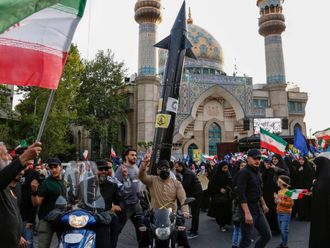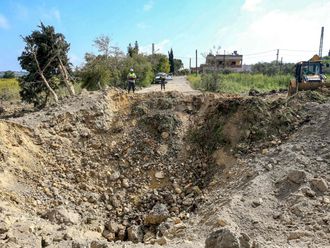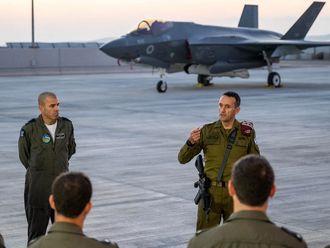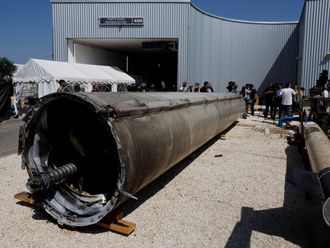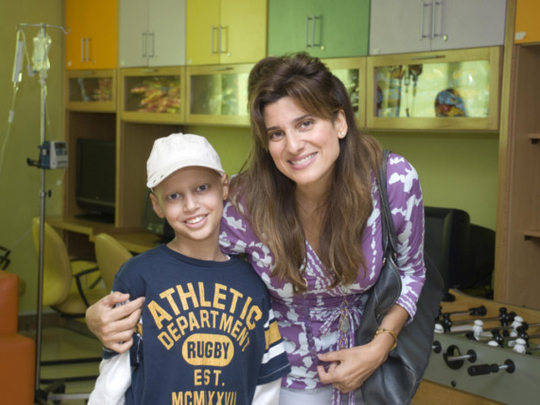
Marrying a prince may be the dream of many a little girl. But for Princess Dina Mired, who was born into the Khalifeh family and later married Prince Mired from Jordan, it served one precious cause: she had the opportunity to help thousands of people.
Princess Dina, the director-general of the King Hussein Cancer Foundation, is seen at most activities related to the foundation’s humanitarian efforts, with a demeanour that exudes warmth. Most of the time she appears with another endearing Jordanian princess who is also involved in the fight against cancer.
Princess Ghida Talal, who is originally from the prominent Lebanese Salaam family, is married to Prince Talal Bin Muhammad, a cousin of King Abdullah of Jordan.
“It is very important for you to know that both Princess Ghida and I feel that our best title is not that of ‘princess’,” Princess Dina said. “The title of princess helps us to remove obstacles, but our best title on our CVs, I would say, is that we have been affected by cancer. My son had cancer at the age of 2. He had leukaemia, and thank God he survived after undergoing a bone marrow transplant,” she added. “At that time, in 1997, there was no cancer centre in Jordan, and so we had to be uprooted from our normal life and spend two and a half years abroad to ensure our son received the medical treatment he needed.”
Princess Dina also faced another ordeal when her father was diagnosed with cancer while she was away for her son’s treatment. But Princess Dina’s father, with whom she shared a close relationship, “wanted so much to be at home” with his family, rather than be away for treatment. In the last two years of his life, her father was treated at the King Hussein Cancer Center.
As for Princess Ghida, she is the wife of a cancer survivor. The ability of the two women to be empathetic to cancer patients and the agony of their loved ones probably “is the best motivation” for their efforts.
Princess Ghida, who founded the International Press Office of the Royal Court in the ’90s and was the press secretary for the late King Hussein, was appointed in 2001 by His Majesty King Abdullah as chairperson of the Board of Trustees of the King Hussein Cancer Foundation.
She later asked Princess Dina to take on the position of director-general. At that time the building was there, but somehow the proper system was missing, Princess Dina noted.
Measures were taken to put the centre on the right track: The law was changed so that it could function like the hospitals abroad. “We have volunteers with different kinds of expertise on the board,” she said.
The brain-drain was reversed to a brain-gain, and some great Jordanian doctors were brought in from abroad.
Whether speaking of her personal experience or her work in the fight against cancer, Princess Dina is passionate. “We have a wonderful team, and all of us believe in what we do,” she said. “There is no more beautiful and more fulfilling work than to help save the lives of those who need it most — cancer patients who cannot afford to travel abroad to receive the life-saving treatment they need — particularly, since cancer does not discriminate, it affects the young and the old, the rich and the poor alike.”
She added, “Of course, I speak with passion about it. I am part of this amazing life-saving success story.”
Princess Dina has a master’s degree in international banking and financial services from Reading University. After she completed her studies, she returned to Jordan in 1991 and worked as project researcher for political and socio-economic issues in the office of Prince Hassan Bin Talal. Since her appointment as director-general of the King Hussein Cancer Foundation, Princess Dina has founded and developed the Fundraising and Development Department.
Princess Dina, a mother of three, is a member on several boards inside and outside Jordan that are involved in the fight against cancer. In September 2011, Princess Dina delivered the keynote speech on behalf of all civil society (social, civic and voluntary organisations) at the opening of the United Nations General Assembly High Level Meeting on Non-Communicable Diseases.


